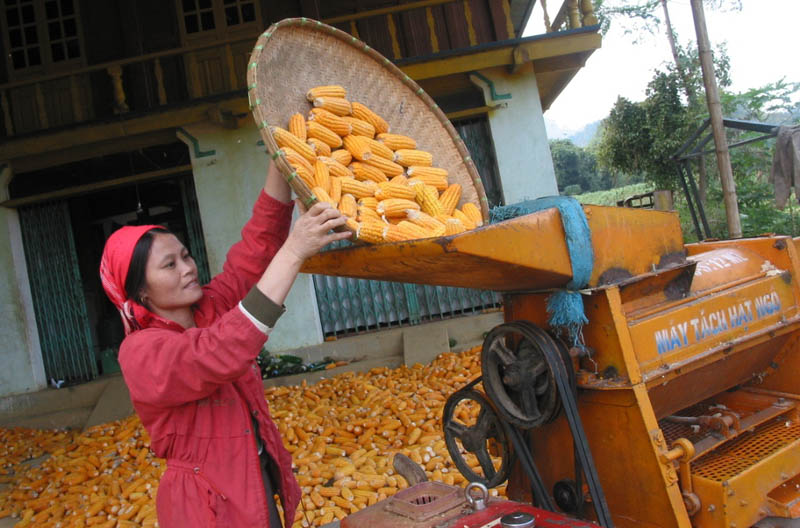
(HBO) – Ethnic minority-inhabited areas in Mai Chau district of northern mountainous Hoa Binh province have flourished thanks to state-supported programmes and projects. Investment has been poured into upgrading infrastructure and stepping up production, thus reducing poverty, eradicating hunger and improving living conditions of the Mong ethnic minority group.
We
visited Tra Day hamlet in Pa Co commune during the main harvest of Shan Tuyet
green tea on all mountains and hills. Sung Y Sua, a tea farmer, said
excitingly: "Thanks to varieties, fertilizers and techniques provided under the
Poverty Reduction Project, tea farmers in the hamlet now have a better life.
There are no more poor households here.”
The project, carried out since 2011, has
connected with enterprises to provide saplings, technical assistance and
establish a tea growing area covering dozens of hectares and a consumption
chain in Pa Co commune. Hills have been planted with Shan Tuyet green teas and
bitter teas, helping improve living conditions of local Mong ethnic minority
people. The commune got rid of the list of poor communes in 2017.
A
household in Khan Ha hamlet, Ba Kham commune (Mai Chau district) has escaped
from poverty thanks to assistance from the Programme
135 in terms of production
tools and new maize varieties.
Ba Kham commune has witnessed remarkable
socio-economic changes since programmes and projects in support of ethnic
minority people were initiated. Inter-hamlet roads among Khan Ho, Khan Thuong
and Khan Ha hamlets have been expanded and upgraded to facilitate trading
activities and transportation of agricultural materials and products.
The Programme 135 and the Poverty Reduction
Project have supported local farmers’ production models, such as growing
Japanese sweet potatoes and ginger and raising pigs and cows. Their living
conditions have been improved with the annual per capita income reaching 9.6
million VND in 2016, and the rate of poor households falling below 50 percent.
Mai Chau district now has eight extremely
disadvantaged communes, namely Cun Pheo, Na Meo, Tan Mai, Tan Dan, Hang Kia, Ba
Khan, Noong Luong and Pu Bin. In 2015 – 2016, nearly 23.4 billion VND (over 1
million USD) was allocated from the Program 135 under Decision 551, dated April
4, 2014 of the Prime Minister for the communes. The programme focused its
support on building infrastructure, with 40 transport, education, irrigation,
communal works built. Priorities were also given to ethnic minority farmers’
production activities.
Many other policies have also benefited ethnic
minority-inhabited areas, including those supplying residential and production
land, and clean water. To date, all needy households have been supplied with
clean water for the daily use, with total cost of 1.2 billion VND (52,800 USD).
Up to 100 households have been provided with agricultural machines and tools
under the job shifting assistance programme. A total of 18,263 people have been
given saplings worth over 1.4 billion VND (61,600 USD).
As many as 530 households in the district have
been provided with preferential loans, worth over 4.2 billion VND (184,800 USD)
to raise cattle and buy agricultural machines. All the loans have been
effectively used and none are over due. Up to 2,749 households have been
enabled to get loans from the credit programme for poor and policy
beneficiaries, with total outstanding debt of nearly 77.8 billion VND (3.4
million USD).
Bui Minh
More than just an information technology teacher, Bui Van Nien is an inspiring figure who has nurtured the scientific curiosity and creative spirit of students in Vietnam’s ethnic minority communities.
Da Bac is the most disadvantaged mountainous district in Hoa Binh province, with ethnic minorities accounting for about 90% of its population. Over the past years, the district has mobilised resources to implement ethnic policies to improve the quality of life of local people.
In recent years, Hoa Binh province has consistently prioritised the protection, care, and education of children, particularly those from ethnic minorities and disadvantaged backgrounds, by creating a safe, healthy, and nurturing environment for their all-round development.
The Steering Committee for Tobacco Harm Prevention and Control of Hoa Binh province, in coordination with the Tobacco Harm Prevention and Control Fund, held a ceremony on May 28 in response to the World No Tobacco Day (May 31) and the National No Tobacco Week (from May 25 to 31). The event was chaired by Nguyen Van Toan, Standing Vice Chairman of the provincial People’s Committee and head of the Steering Committee.
Since 2021, the Center for Industrial Promotion and Industrial Development Consulting (CIIDC) under the Department of Industry and Trade has been implementing a school lighting model as part of the plan for using energy efficiently and economically in Hoa Binh Province in the pẻiod of 2021 - 2025. This model not only aims to improve the learning conditions and enhance the education quality, but it also promotes the message of energy saving, energy security, environmental protection and contributes to the goals of socio-economic development.
In the 2024 - 2025 school year, the entire Hoa Binh provincial education sector includes 520 educational institutions and schools. Among them are 13 ethnic boarding schools with 153 classes and 4,487 students. Four of these schools have met national standards, reaching 30.7 percent.



